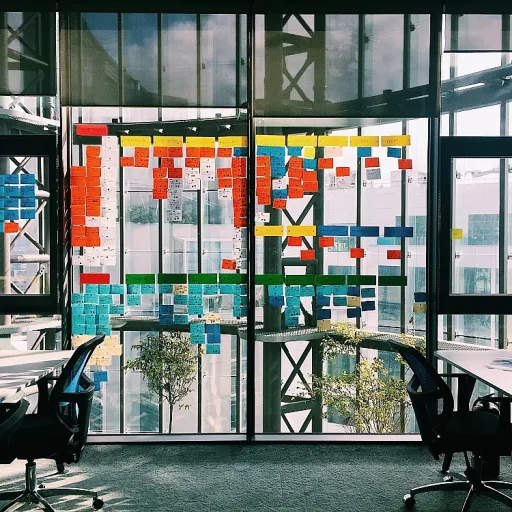
Understanding the pace of business in the Arabian Emirate context
The Unique Rhythm of Business in the UAE
When planning interviews in an Arabian Emirate company, understanding the local business rhythm is essential. The workweek typically runs from Monday to Friday, with Friday being a shorter day for many organizations due to religious observances. This impacts how you schedule interviews, especially if you are considering back to back interviews or multiple rounds in a single day.
The pace of business in the UAE is dynamic, but it also values thoughtful decision-making and relationship-building. While efficiency is important, the interview process often involves several team members and may require more time than in some Western contexts. This means that scheduling interviews back to back might not always align with the best practices for the region.
- Team members may have different views on the best interview questions and the ideal time frame for each round.
- It is common for the hiring process to involve multiple rounds, sometimes spread over back days rather than a single interview day.
- Office managers should consider the availability of interviewers and the need for breaks between interviews to ensure each candidate receives full attention.
In the UAE, hospitality and respect are highly valued. Rushing through the interview scheduling process can send the wrong message to candidates and may affect your company’s reputation. Balancing efficiency with these cultural expectations is key to a successful hiring process.
For more insights on effective recruitment strategies for your team, consider how local business culture shapes the interview process and scheduling best practices.
Balancing efficiency with hospitality during interviews
Finding the Right Balance Between Speed and Hospitality
In the Arabian Emirate business environment, efficiency is highly valued, but so is hospitality. When scheduling interviews back to back, office managers often face the challenge of balancing a streamlined hiring process with the region’s strong emphasis on making guests feel welcome. This balance is crucial for both the candidate experience and the company’s reputation.
While it may seem efficient to schedule interviews back to back, it’s important to consider how this approach can impact both candidates and interviewers. Here are some practical points to keep in mind:
- Allow for Buffer Time: Scheduling interviews with no breaks can leave little room for delays or extended conversations. Adding short breaks between interviews gives both candidates and interviewers time to regroup, reflect on interview questions, and prepare for the next round.
- Hospitality Matters: In the Emirates, offering refreshments and a welcoming environment is part of best practices. Rushing candidates from one interview to the next may undermine this tradition and affect how your company is perceived.
- Team Member Coordination: When multiple team members are involved in the interview process, back to back interviews can lead to fatigue and rushed assessments. Ensuring everyone has time to share their views and discuss candidates between rounds helps maintain quality in the hiring process.
- Candidate Experience: Candidates appreciate a well-organized interview day. If interviews are scheduled too tightly, candidates may feel pressured or undervalued, which can impact their impression of your company and their willingness to accept a job offer.
For office managers, the key is to design an interview scheduling process that respects both the need for efficiency and the cultural expectations of hospitality. This approach not only helps finish interviewing within the desired time frame but also supports a positive and professional image for your organization.
For more insights on how strategic hiring can unlock your office team’s full potential, you may find this article helpful: unlocking the full potential of your office team.
Managing candidate experience and company reputation
How Interview Scheduling Shapes Candidate Perceptions
The way interviews are scheduled in an Arabian Emirate company can significantly impact how candidates view the hiring process and the company’s reputation. When interviews are scheduled back to back, it might seem efficient for the team, but it can also create a rushed atmosphere for both the interviewer and the candidate. This can lead to candidates feeling undervalued or that their time is not respected.- Back to back interviews may limit the time available for meaningful conversation and thoughtful interview questions.
- When the interviewer is pressed for time, the interview process can feel mechanical, missing the personal touch valued in the region.
- Multiple interviews in a single day can be exhausting for both candidates and team members, potentially affecting performance and impressions.
Ensuring a Positive Candidate Experience
A well-organized interview day, with appropriate gaps between interviews, allows candidates to compose themselves and reflect on their experience. This approach also gives the hiring team time to discuss each candidate, ensuring a fair and thorough evaluation. Candidates who feel respected during the scheduling process are more likely to view the company positively, regardless of the outcome.- Allowing time between interviews helps candidates prepare for each round and reduces stress.
- Team members can align on interview questions and share views on candidates, improving the overall hiring process.
- Scheduling interviews with care demonstrates the company’s commitment to best practices and professionalism.
Building Trust Through Thoughtful Scheduling
The reputation of an Arabian Emirate company depends not just on the outcome of the hiring process, but also on how candidates are treated throughout. A thoughtful interview scheduling process shows that the company values both efficiency and hospitality. This balance is crucial for attracting top talent and maintaining a strong employer brand. For office managers seeking to enhance their skills in managing the interview process and scheduling best practices, exploring resources like the Control Account Manager Certification can provide valuable insights. Good luck with your next round of interviews—remember, the way you schedule interviews back to back can make all the difference in candidate experience and your company’s reputation.Practical considerations for office managers
Key Steps for Efficient Interview Scheduling
For office managers in Arabian Emirate companies, organizing interviews back to back can seem like a smart way to save time. However, the scheduling process requires careful planning to ensure a smooth hiring process and a positive experience for both candidates and team members. Here are some practical tips:- Build in Buffer Time: Avoid scheduling interviews directly back to back. Allow at least 10-15 minutes between interviews. This gives interviewers time to prepare for the next candidate, review interview questions, and handle any unexpected delays.
- Coordinate with Team Members: Make sure all interviewers are aware of the interview day schedule. Share the time frame for each round and confirm availability to prevent last-minute changes that could disrupt the process.
- Centralize Scheduling: Use a shared calendar or scheduling tool to manage interview times. This helps everyone involved in the hiring process stay updated and reduces the risk of double-booking or confusion.
- Communicate Clearly with Candidates: When you schedule interviews, provide candidates with clear instructions about the interview time, location (or virtual meeting link), and what to expect during the process. This helps candidates feel prepared and valued.
- Prepare for Multiple Rounds: If your hiring process involves several rounds of interviews in one day, make sure candidates know in advance. This transparency helps set expectations and allows candidates to plan their day accordingly.
Best Practices for a Smooth Interview Day
- Assign a Point of Contact: Designate a team member to greet candidates, answer questions, and guide them through the interview process. This adds a personal touch and supports the company’s reputation for hospitality.
- Monitor the Schedule: Keep track of the interview schedule throughout the day. If one interview runs over time, adjust the following interviews or inform candidates about any delays to maintain a positive experience.
- Gather Feedback Promptly: After each interview, encourage interviewers to record their views and impressions while details are fresh. This helps in making informed hiring decisions and speeds up the process of finishing interviewing all candidates.
Cultural sensitivities and communication styles
Respecting Traditions and Building Trust
When scheduling interviews back to back in an Arabian Emirate company, it is essential to recognize the importance of cultural norms. The local business environment values hospitality, respect, and relationship-building. These elements can influence the interview process and the way candidates and team members interact.
- Time perception: In the Emirates, time can be viewed more flexibly than in some Western contexts. Strictly timed back-to-back interviews may not align with expectations, especially if conversations run longer due to meaningful exchanges or hospitality gestures.
- Communication style: Directness is often balanced with politeness and indirect cues. Interviewers and candidates may take extra time to build rapport, so scheduling interviews too closely together can create unnecessary pressure.
- Hierarchy and respect: Senior team members or decision-makers might join interviews at different times. Allowing a buffer between interviews shows respect for their schedules and the candidate’s experience.
Best Practices for Culturally Sensitive Interview Scheduling
To ensure the hiring process respects both efficiency and local customs, consider these best practices:
- Leave adequate time between interviews to accommodate longer discussions or hospitality rituals, such as offering coffee or tea.
- Communicate the interview time frame clearly to all candidates and interviewers, but remain flexible if conversations extend.
- Encourage team members to share their views on the scheduling process, as diverse perspectives can help refine your approach.
- Prepare interview questions that allow for open dialogue, rather than rushing through a checklist, to foster trust and understanding.
By adapting the interview scheduling process to local communication styles and cultural expectations, office managers can help ensure a positive experience for all involved. This approach not only supports the company’s reputation but also helps attract the best candidates for the job.
Adapting interview scheduling to remote and hybrid work trends
Embracing Flexibility in Modern Interview Scheduling
As remote and hybrid work trends become more common in Arabian Emirate companies, office managers face new challenges in interview scheduling. The traditional approach of scheduling interviews back to back in a single day may not always fit the evolving needs of both candidates and interviewers. Here are some practical points to consider:
- Time Zones and Availability: With candidates and team members possibly working from different locations, coordinating interview time frames can be complex. Allowing for flexible scheduling, rather than forcing interviews back to back, helps accommodate everyone’s availability and avoids unnecessary stress.
- Technology and Communication: Virtual interviews require reliable technology and clear communication. Ensure all parties are comfortable with the chosen platform and have the necessary links and instructions ahead of time. This reduces delays and helps the interview process run smoothly.
- Breaks and Preparation: When scheduling multiple interviews in a day, especially remotely, remember to allow breaks for both interviewers and candidates. Short gaps between interviews give everyone time to prepare, reflect on interview questions, and avoid fatigue.
- Team Member Participation: In a hybrid setting, some team members may join interviews from the office while others connect remotely. Make sure the scheduling process takes into account the different locations and technical needs of each participant.
- Candidate Experience: The hiring process is often the first impression a candidate gets of your company. A well-organized interview day, with clear communication and reasonable time frames, shows respect for the candidate’s time and sets a positive tone for the job opportunity.
Adapting your interview scheduling best practices to fit remote and hybrid work models is essential for maintaining efficiency and professionalism. By considering these factors, office managers can ensure the interview process remains effective, even as the workplace continues to evolve.













